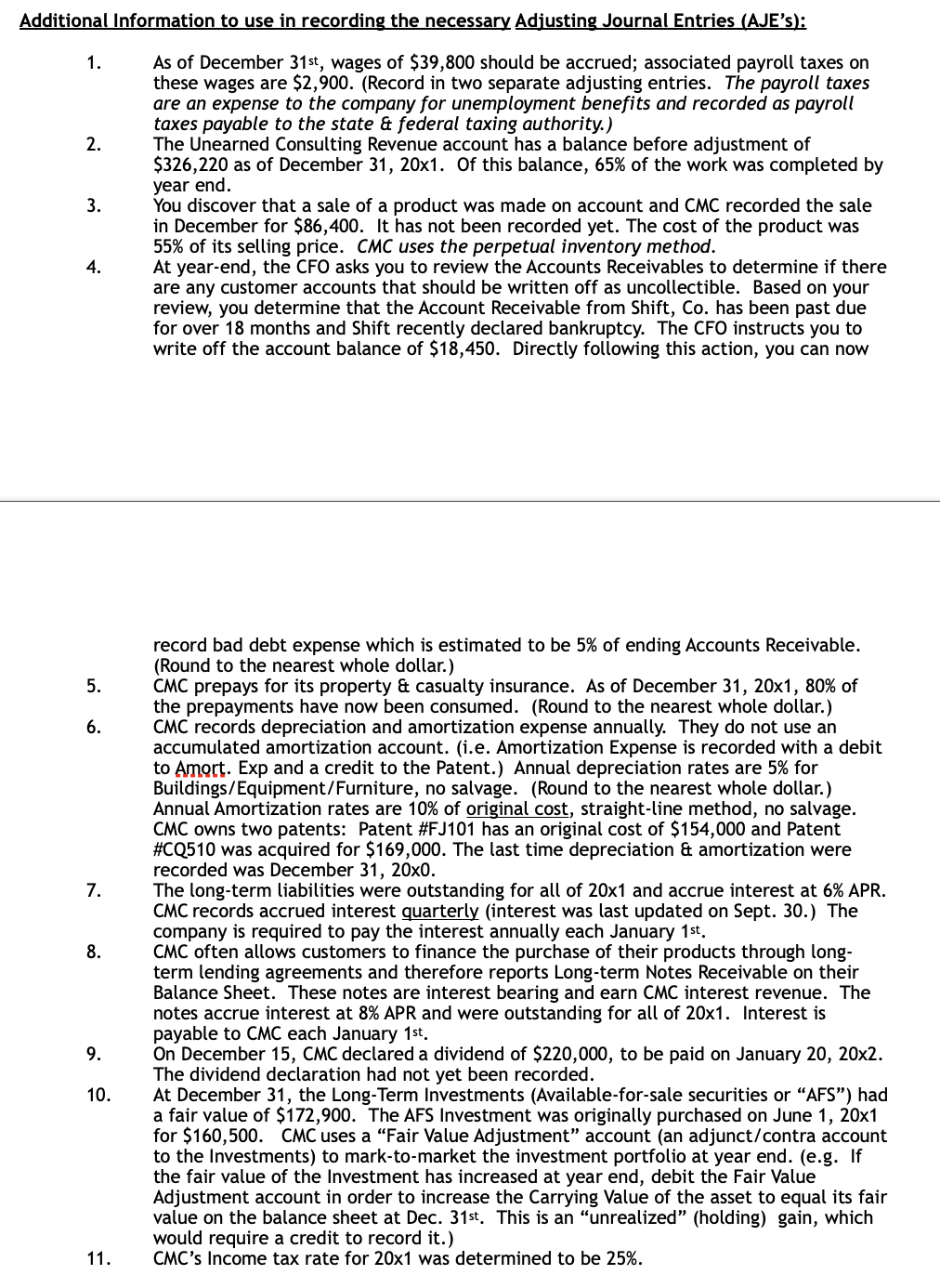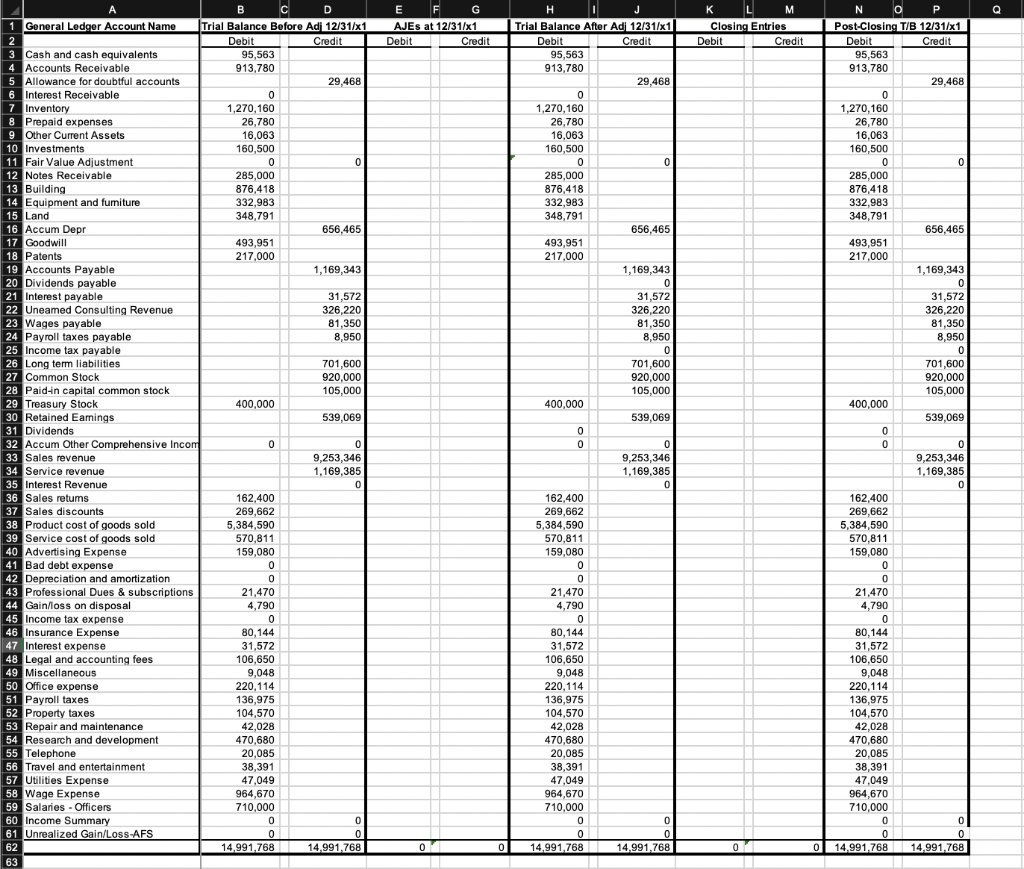Record the 11 adjusting journal entries based on the information given below. Trial balance is provided.


Additional Information to use in recording the necessary Adjusting Journal Entries (AJE's): 1. As of December 31 st, wages of $39,800 should be accrued; associated payroll taxes on these wages are $2,900. (Record in two separate adjusting entries. The payroll taxes are an expense to the company for unemployment benefits and recorded as payroll taxes payable to the state \& federal taxing authority.) 2. The Unearned Consulting Revenue account has a balance before adjustment of $326,220 as of December 31,201. Of this balance, 65% of the work was completed by year end. 3. You discover that a sale of a product was made on account and CMC recorded the sale in December for $86,400. It has not been recorded yet. The cost of the product was 55% of its selling price. CMC uses the perpetual inventory method. 4. At year-end, the CFO asks you to review the Accounts Receivables to determine if there are any customer accounts that should be written off as uncollectible. Based on your review, you determine that the Account Receivable from Shift, Co. has been past due for over 18 months and Shift recently declared bankruptcy. The CFO instructs you to write off the account balance of $18,450. Directly following this action, you can now record bad debt expense which is estimated to be 5% of ending Accounts Receivable. (Round to the nearest whole dollar.) 5. CMC prepays for its property \& casualty insurance. As of December 31,201,80% of the prepayments have now been consumed. (Round to the nearest whole dollar.) 6. CMC records depreciation and amortization expense annually. They do not use an accumulated amortization account. (i.e. Amortization Expense is recorded with a debit to Amorth. Exp and a credit to the Patent.) Annual depreciation rates are 5% for Buildings/Equipment/Furniture, no salvage. (Round to the nearest whole dollar.) Annual Amortization rates are 10% of original cost, straight-line method, no salvage. CMC owns two patents: Patent #FJ101 has an original cost of $154,000 and Patent #CQ510 was acquired for $169,000. The last time depreciation \& amortization were recorded was December 31,200. 7. The long-term liabilities were outstanding for all of 201 and accrue interest at 6% APR. CMC records accrued interest quarterly (interest was last updated on Sept. 30.) The company is required to pay the interest annually each January 1 st. 8. CMC often allows customers to finance the purchase of their products through longterm lending agreements and therefore reports Long-term Notes Receivable on their Balance Sheet. These notes are interest bearing and earn CMC interest revenue. The notes accrue interest at 8% APR and were outstanding for all of 201. Interest is payable to CMC each January 1 st. 9. On December 15, CMC declared a dividend of $220,000, to be paid on January 20,202. The dividend declaration had not yet been recorded. 10. At December 31, the Long-Term Investments (Available-for-sale securities or "AFS") had a fair value of $172,900. The AFS Investment was originally purchased on June 1, 20x1 for $160,500. CMC uses a "Fair Value Adjustment" account (an adjunct/contra account to the Investments) to mark-to-market the investment portfolio at year end. (e.g. If the fair value of the Investment has increased at year end, debit the Fair Value Adjustment account in order to increase the Carrying Value of the asset to equal its fair value on the balance sheet at Dec. 31st. This is an "unrealized" (holding) gain, which would require a credit to record it.) 11. CMC's Income tax rate for 201 was determined to be 25%. Additional Information to use in recording the necessary Adjusting Journal Entries (AJE's): 1. As of December 31 st, wages of $39,800 should be accrued; associated payroll taxes on these wages are $2,900. (Record in two separate adjusting entries. The payroll taxes are an expense to the company for unemployment benefits and recorded as payroll taxes payable to the state \& federal taxing authority.) 2. The Unearned Consulting Revenue account has a balance before adjustment of $326,220 as of December 31,201. Of this balance, 65% of the work was completed by year end. 3. You discover that a sale of a product was made on account and CMC recorded the sale in December for $86,400. It has not been recorded yet. The cost of the product was 55% of its selling price. CMC uses the perpetual inventory method. 4. At year-end, the CFO asks you to review the Accounts Receivables to determine if there are any customer accounts that should be written off as uncollectible. Based on your review, you determine that the Account Receivable from Shift, Co. has been past due for over 18 months and Shift recently declared bankruptcy. The CFO instructs you to write off the account balance of $18,450. Directly following this action, you can now record bad debt expense which is estimated to be 5% of ending Accounts Receivable. (Round to the nearest whole dollar.) 5. CMC prepays for its property \& casualty insurance. As of December 31,201,80% of the prepayments have now been consumed. (Round to the nearest whole dollar.) 6. CMC records depreciation and amortization expense annually. They do not use an accumulated amortization account. (i.e. Amortization Expense is recorded with a debit to Amorth. Exp and a credit to the Patent.) Annual depreciation rates are 5% for Buildings/Equipment/Furniture, no salvage. (Round to the nearest whole dollar.) Annual Amortization rates are 10% of original cost, straight-line method, no salvage. CMC owns two patents: Patent #FJ101 has an original cost of $154,000 and Patent #CQ510 was acquired for $169,000. The last time depreciation \& amortization were recorded was December 31,200. 7. The long-term liabilities were outstanding for all of 201 and accrue interest at 6% APR. CMC records accrued interest quarterly (interest was last updated on Sept. 30.) The company is required to pay the interest annually each January 1 st. 8. CMC often allows customers to finance the purchase of their products through longterm lending agreements and therefore reports Long-term Notes Receivable on their Balance Sheet. These notes are interest bearing and earn CMC interest revenue. The notes accrue interest at 8% APR and were outstanding for all of 201. Interest is payable to CMC each January 1 st. 9. On December 15, CMC declared a dividend of $220,000, to be paid on January 20,202. The dividend declaration had not yet been recorded. 10. At December 31, the Long-Term Investments (Available-for-sale securities or "AFS") had a fair value of $172,900. The AFS Investment was originally purchased on June 1, 20x1 for $160,500. CMC uses a "Fair Value Adjustment" account (an adjunct/contra account to the Investments) to mark-to-market the investment portfolio at year end. (e.g. If the fair value of the Investment has increased at year end, debit the Fair Value Adjustment account in order to increase the Carrying Value of the asset to equal its fair value on the balance sheet at Dec. 31st. This is an "unrealized" (holding) gain, which would require a credit to record it.) 11. CMC's Income tax rate for 201 was determined to be 25%








